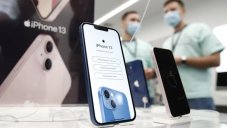Google Found iPhone Security Flaws That Let Websites Hack Your Data For Years
Dhir Acharya - Aug 31, 2019

According to security researchers under Google’s Project Zero, they discovered several hacked sites which slipped malware to people’s iPhones for years.
- Apple iPhone 15 Launch Date in India, Price, Specifications & More
- Apple Kills Original HomePod, Focusing On HomePod Mini
- iPhone 12 Color Is Fading Away Quickly And No One Knows Why
According to security researchers under Google’s Project Zero, they discovered several hacked sites which slipped malware to people’s iPhones for years. If users go to one of those websites, their photos, location data, and messages, could have been stolen. The findings were reported to Apple earlier this year, and the company patched the vulnerability in the same update with the eavesdropping bug in FaceTime.

Ian Beer, a researcher from Project Zero wrote in a blog post on Thursday that detailed the team’s discovery:

Those attacks indicate the vulnerabilities that are hardly seen in iPhones, which are known for great security. Apple has offered security researchers up to $1 million if they discover critical vulnerabilities on its devices. It’s often difficult to attack iPhones and attacks are usually hacking information between countries. There’s no telling who’s behind the attack which could compromise millions of devices with just one visit.

Malwarebytes director of Mac and mobile security Thomas Reed, said:

The hack did not work off of just one vulnerability. It was found by Google’s team that it took advantage of 14 zero-day vulnerability in five separate exploit chains. Those vulnerabilities ran on iOS versions from 10 to 12, which means iPhone users have been targeted for at least two years. In February, Google reached out to Apple and disclosed the vulnerability, it took the iPhone maker less than a week to patch the issue.
With this hack, attackers gain full control of their victims’iPhones, which let them obtain real-time location data, install malicious apps, steal photos as well as messages despite encryption. As the malware has deep access, it’s able to get message contents before they got encrypted, according to Google’s researchers. The implant could gain access to the keychain of the device, including database files and passwords by messaging apps with end-to-end encryption such as iMessage, Telegram, and WhatsApp.

Since the attacks stole users' personal information, they sent data without encryption, meaning people using the same Wi-Fi network could view the stolen content too.
And if users rebooted their Apple phones, the malware was removed, but it would return once users revisited a hacked website, as noted in the report. In addition, even after the malware had gone, hackers could further damage to the device using stolen private messages and passwords it obtained. Reed added that users cannot tell if their devices have been affected either.
iOS does not include scanning malware, which might have contributed to the hack, the researcher pointed out. He said that iOS’ nature is keeping devices secure, but this may have turned into a tool against users in this hack as it prevents the attack from being found.
Apple refused to comment but you should ensure your iPhone has got the latest update to keep this vulnerability away from you.
Featured Stories

ICT News - Jan 18, 2024
PDF Prodigy: Expert Techniques for Editing

ICT News - Aug 03, 2023
The Psychology of Casino Game Design

ICT News - May 17, 2022
3 Reasons your privacy gets compromised online

ICT News - May 11, 2022
Apple Devices For Sale

ICT News - Apr 12, 2022
Pin-Up Review India 2022

ICT News - Mar 29, 2022
Choosing between a shared and a dedicated server for gaming

ICT News - Mar 18, 2022
How The Internet Came Into Being

ICT News - Mar 17, 2022
The Best Gaming Tech of 2022

ICT News - Feb 16, 2022
Technologies that enable the development of online casinos with live dealers

ICT News - Feb 08, 2022
Comments
Sort by Newest | Popular